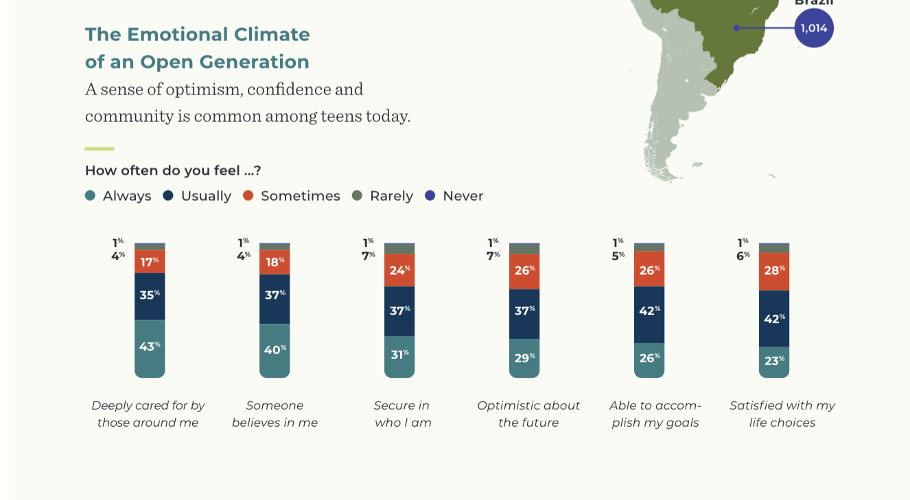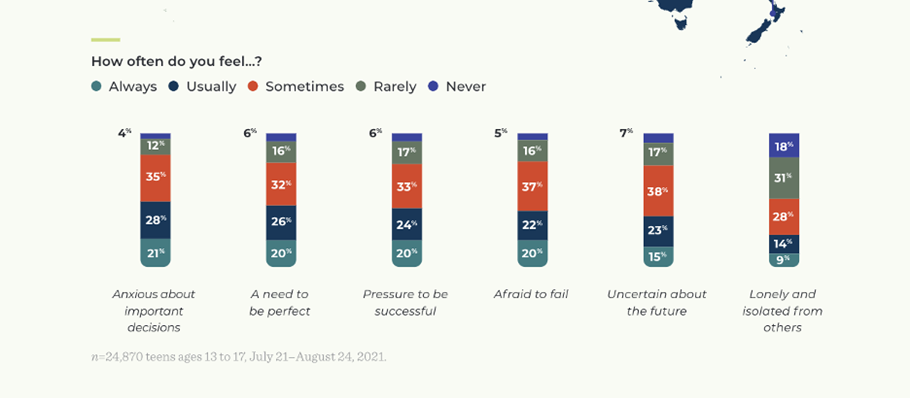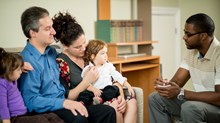3 Ways to Help Today's Youth Stay Optimistic, Curious, and Engaged

Many articles and studies today paint a picture of Generation Z as one steeped in uncertainty, doubt, cynicism, and isolation. But the latest Barna study, The Open Generation, paints a different picture, and one that we leaders need to take seriously. Simply put: Teens today are open to experiences, harbor a desire to change the world around them, and have a vision for a more hopeful future.
These are all things that can counter the dispiriting reality many adults find themselves in; after all, we live in a time of economic and political uncertainty and are still healing from the impact of a two-year global pandemic. Fear is no stranger to many of us.
This, too, is the world in which teens are growing up. That said, what we at Barna found when we surveyed nearly 25,000 teens ages 13-17 around the world is rather remarkable: Despite the current social climate and challenges, there’s an undercurrent of optimism, openness, and engagement among Gen Z. There’s what we might call a “lightness of being” that keeps teens today curious and longing to see change in our world.
This is very good news in an often-gloomy world. Let’s look at two realities of teens today and then at the ways that those of us who are older can help nurture and foster the goodness in them.
Teens today are optimistic and confident.
The Open Generation study looked at the emotional climate of global teens today, and what we found was stunning:
● 78% feel deeply cared for by those around them always or usually
● 77% say someone believes in them always or usually
● 68% are secure in who they are always or usually
● 63% are optimistic about the future always or usually
This is all encouraging news. But what we also found is that these feelings don’t exist in isolation. Teens who have community and connections with those around them are far more likely to report these feelings. Trusted adults and a strong support system matter deeply in the formation of secure, hopeful, curious kids.

The Open Generation study shows a strong correlation between having community and connections and being more open to Jesus and the Bible and to addressing injustices in the world. Being rooted in community and relationships also correlates with a higher likelihood of teens not only being open to these but also engaging deeply with them later on.
Yet, teens today aren’t naïve and free of worry.
We can’t develop an overly rosy picture of how teens today think and feel. In fact, the data from the study tells us that teens today aren’t immune to what adults are dealing with:
● 49% are anxious about important decisions always or usually
● 46% have a need to be perfect always or usually
● 48% are uncertain about the future always or usually
● 23% feel lonely or isolated from others always or usually
These numbers are not surprising, given the current challenges both teens and adults are facing on systemic and personal levels.

Trusted adults can cultivate the lightness in teens today.
Yes, anxiety, uncertainty, and loneliness are still present in this emerging generation, but the teens who experience these challenges in the midst of loving and lasting community may be more equipped to overcome them, and this openness, optimism, and engagement shine an encouraging light on their potential to do so.
So, how do adults today nurture and cultivate the “lightness of being” in teens today, even as youth become more aware of the pressures of growing up and realities of the world? Let me suggest three ways forward:
First, foster community.
Barna’s data has shown time and time again that pouring into the lives of young people plays a key role in their formation. In The Open Generation study, this story emerges once again. As teens’ satisfaction with their community increases, so, too, does the likelihood that they will say they are optimistic about the future, secure in who they are, and satisfied with their life choices. These teens are also the least likely to say that they never feel "uncertain about the future," "afraid to fail," or "lonely and isolated from others."
Teens with strong community and connection are also the most likely to say that it is “very true” that they are important to others, feel good about themselves, are understood by their parents or guardians, and are cared for by others. These teens also show emotional health that generations just ahead of them do not. What would it look like for adults to intentionally engage and invest in the lives of young people, and to foster the kind of community where teens today can flourish?
Second, cultivate an engagement with and appreciation of the Bible.
The more teens are invested in and in community with adults in their lives, the more engaged they are with the Bible. Also, the more engaged they are with the Bible, the more likely they are to report that they are hopeful and optimistic about the world’s future and that they can make a positive impact on the world. What would it look like for adults to help teens today to see how God’s Word not only provides hope for them but also hope for a world they long to see transformed?
Third, tell the story of Jesus.
The gospel carries a beautiful message, unique among all other faiths. It is the story of a God who became man to show a world that He loved them more dearly than His own life.
This same Jesus spoke of the importance of youth, the value of youthful innocence and earnestness, and the importance of trusted adults in the lives of young people.
One of the best things adults can do as they are in community with teens is to tell the story of Jesus and of His continuing love for them and for the world. What would it look like if the story of Jesus’s love for teens today was always one adults were telling and sharing with young people?
As today’s teens grow into young adults, they will face more realities that will serve to weigh down their lightness and diminish the optimism, engagement, and curiosity that mark their youth. Pastors, parents, and all of us who play a part in the lives of these young people must do everything possible to create environments where they will flourish and grow into healthy, happy children of God who not only feel empowered to change the world but go on to achieve this. As this happens, these same adults will become anchors for today’s youth as they hit rough patches ahead, unwavering in their ability to see the world through fresh and hopeful eyes.
Ashley Ekmay is a research specialist with Barna Group.
The Better Samaritan is a part of CT's
Blog Forum. Support the work of CT.
Subscribe and get one year free.
The views of the blogger do not necessarily reflect those of Christianity Today.
























